From August 6 to 9, ProfessorJiang Fan, Party Secretary of SJTUSM, and Professor Zhao Wenhua, Deputy Party Secretary, led a delegation to visit Macao and signed multiple cooperation agreements with the University of Macau and Macau University of Science and Technology. These agreements aim to strengthen in-depth cooperation between SJTU School of Medicine and Macao universities in areas such as student exchanges, talent cultivation, and scientific research innovation and transformation. During the visit, the delegation also attended the Shanghai-Macao Science and Technology Innovation Dialogue, held a Shanghai-Macao Youth Symposium, organized the "Exhibition of Photographs of Wang Zhenyi, Recipient of the Medal of the Republic," and staged the premiere of the original play “The Humble Peony” in Macao. Additionally, the Shanghai Jiao Tong University School of Medicine Alumni Association (Macao Chapter) was established. This visit marked an important milestone in medical and cultural cooperation between SJTU School of Medicine and Macao universities, injecting new momentum into the coordinated development of science, technology, and humanities between Shanghai and Macao, and contributing to a new pattern of development for both regions.
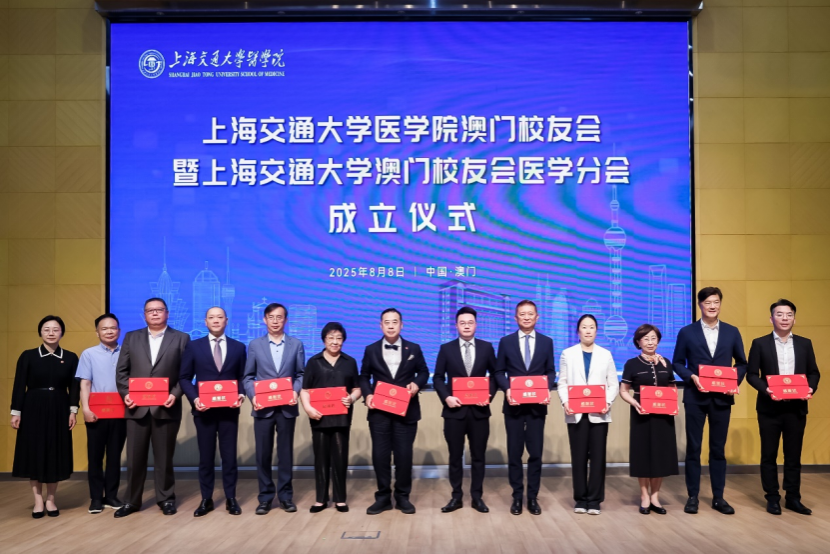
On August 7, Jiang Fan and Song Yonghua, Rector of the University of Macau, signed a memorandum of understanding and a summer research internship cooperation agreement between the two universities. The two institutions had previously achieved multiple collaborative outcomes in the field of medical research. The new agreements will further promote faculty and student exchanges, interdisciplinary collaboration, and the research translation, bringing together the research and policy advantages of Shanghai and Macao to advance medical development.
That afternoon, the delegation attended the 2025 Pujiang Innovation Forum — Shanghai–Macao Science and Technology Innovation Dialogue, jointly organized by the Ministry of Science and Technology and the Shanghai Government. During the roundtable discussion themed “Building a Science and Technology Innovation Ecosystem Together”, Jiang Fan delivered remarks. She noted that Shanghai and Macao share similar cultural genes characterized by inclusiveness and a pioneering spirit of innovation. In the face of future societal transformation challenges posed by declining birth rates and population aging, the two regions have broad prospects for cooperation in science and technology innovation as well as medical collaboration. She emphasized that both sides should further enhance policy coordination, strengthen joint platform building, promote joint talent cultivation, and work together to create a world-class hub for
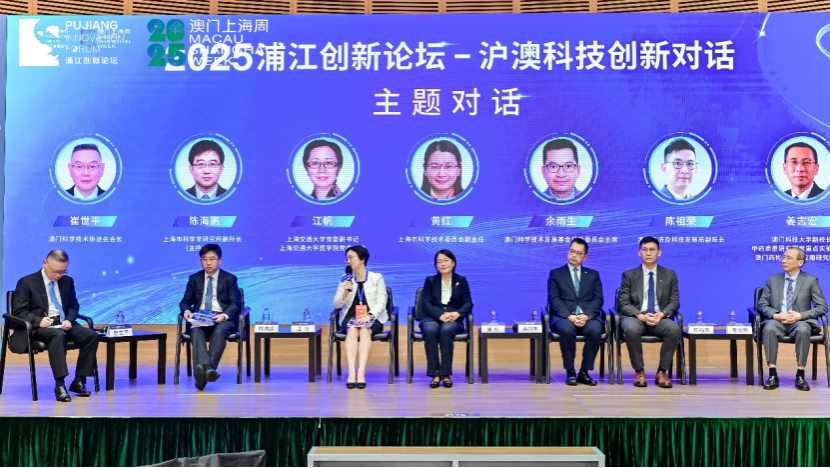
biopharmaceutical innovation with international influence.
On the morning of August 8, Jiang Fan and Zhao Wenhua accompanied Mayor Gong Zheng and his delegation on a visit to Macau University of Science and Technology (MUST), where they toured the State Key Laboratory of Quality Research in Chinese Medicine and the university’s achievement exhibition hall. Following the visit, SJTUSM and MUST held a cooperation signing ceremony. The agreements aim to establish a comprehensive partnership, expand exchanges in teaching and research, promote collaboration, and contribute to the "Healthy China" initiative.
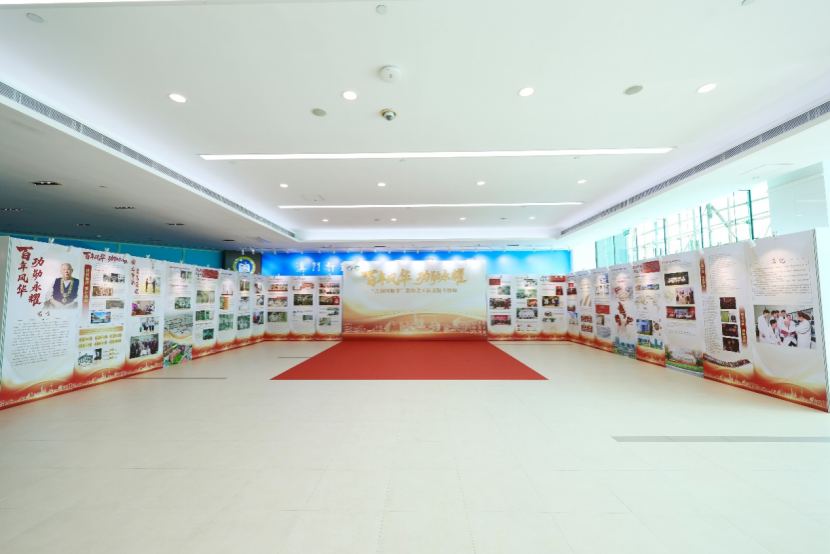
On the morning of August 8, the photo exhibition of Academician Wang Zhenyi, Recipient of the Medal of the Republic opened at the Macau University of Science and Technology (MUST). Featuring more than 100 precious photographs and over 10,000 words of captions, the exhibition vividly and comprehensively portrays Academician Wang Zhenyi’s journey — from his youthful aspiration to practice medicine and save lives, to his eventual achievement as a recipient of the Medal of the Republic — and showcases his noble spirit as a physician, scientist, and educator. This marks the first time the exhibition has been held outside mainland China following its display in Shanghai. Jiang Fan introduced Wang Zhenyi’s moving life story and lofty spirit to the guests and students, noting that his spirit embodies not only the ethos of the SJTU School of Medicine but also serves as a model of the spirit of Shanghai, inspiring future generations to forge ahead and strive for excellence. Professor Liu Junling, representing the scientists of the School of Medicine, expressed his commitment to carrying forward Academician Wang’s pioneering spirit and dedication to the wellbeing of humanity. He emphasized leveraging the School’s innovative model of “basic research – patent portfolio – industrial transformation” to explore and implement a replicable and scalable “SJTUSM Solution” for transforming medical scientific and technological achievements, thereby contributing to the development of Shanghai into a leading hub for the biopharmaceutical industry.
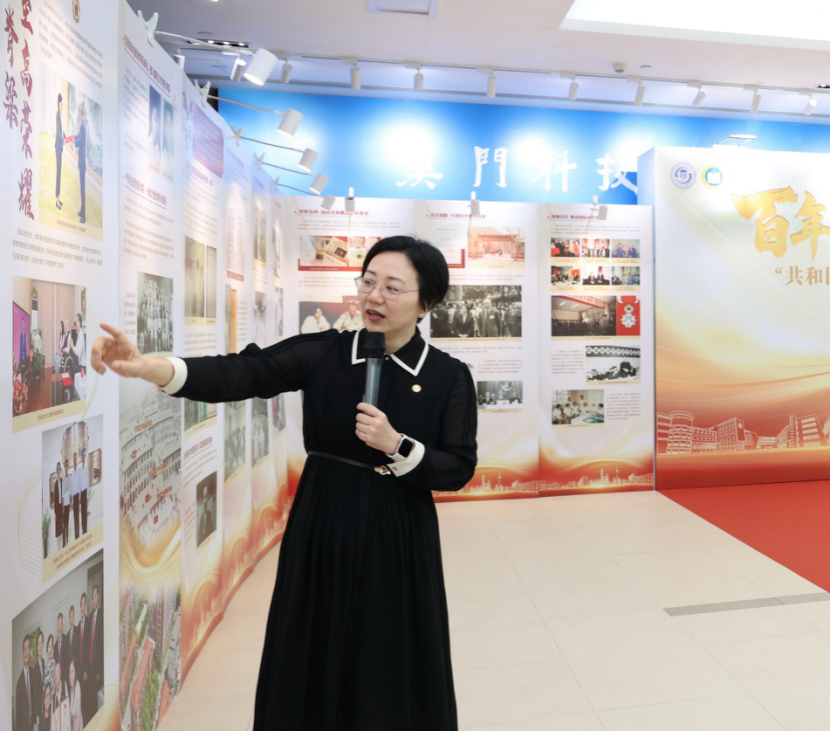
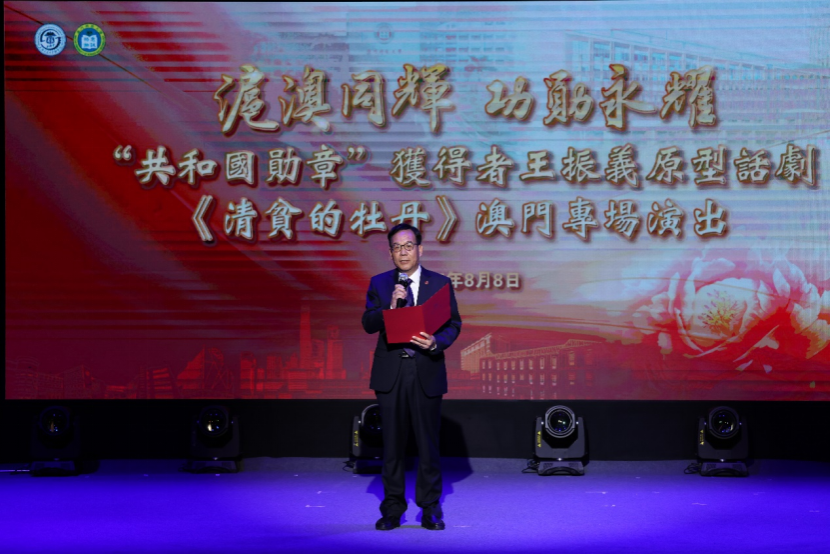
On the evening of August 8, the stage play“The Humble Peony”, inspired by the life of Academician Wang Zhenyi, was grandly performed at the Macau University of Science and Technology (MUST). As one of the key events of the 2025 Shanghai–Macao Medical Humanities Exchange, the performance was co-hosted by the Shanghai Jiao Tong University School of Medicine and MUST. Nearly 400 people, including representatives from all sectors of society and alumni of the SJTUSM from Hong Kong and Macao, gathered for this feast of science and the humanities, bearing witness to the vivid passing down of Academician Wang Zhenyi’s noble “humble peony” spirit in the Guangdong–Hong Kong–Macao Greater Bay Area. Zhao Wenhua presided over the launch ceremony of the play.
The grand stage play“The Humble Peony” is based on the life of Academician Wang Zhenyi, recipient of the Medal of the Republic, and is one of the productions under the “Scientist Story Stage Play Promotion Initiative” of the China Association for Science and Technology. The play focuses on the noble professional ethics and values of both physicians and educators, and has undergone a comprehensive upgrade in stage design, lighting, sound, and script. The creative team employed modern stage art techniques such as 3D projection and multimedia interaction to portray in vivid detail Wang’s determination to study medicine, his reverence for life as he embarked on his medical journey, his perseverance through countless obstacles and breakthroughs in medical challenges, and his eventual rise to become a master in the field — all while embodying his “humble yet noble” peony spirit. The play also incorporates episodes from Wang’s academic pursuits, love story, and dedication to nurturing students, allowing the audience to fully appreciate his masterful character in an immersive experience. The cast consists entirely of clinical doctors, frontline faculty members, counselors, and medical students from the School of Medicine, all of whom are both admirers of
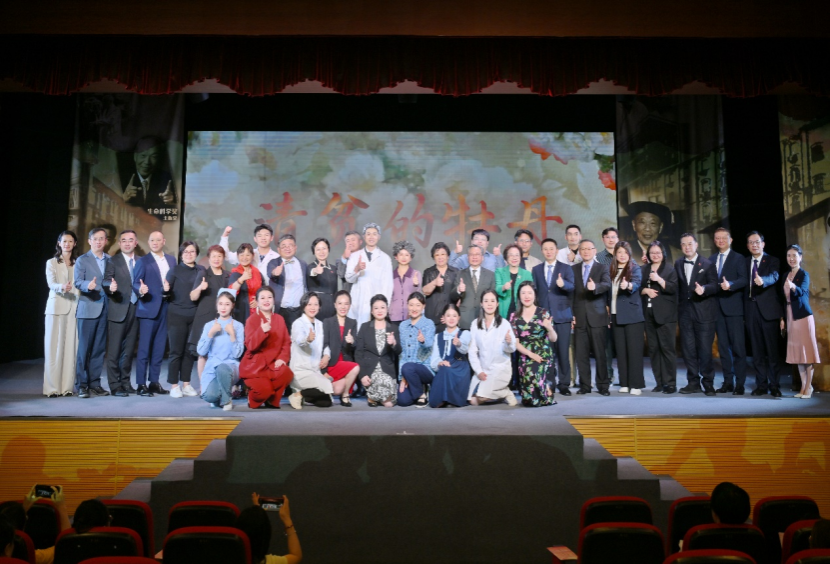
Academician Wang and passionate lovers of the stage.
The Macao premiere of“The Humble Peony” marked the play’s first performance outside mainland China. It not only allowed Macao audiences to experience firsthand the profound power embodied in an outstanding cultural work from the mainland, enhancing their recognition of the nation’s development achievements and core values, but also provided valuable inspiration for strengthening cultural exchanges between universities in Shanghai and Macao. It further encouraged the exploration of more creative themes with contemporary significance and distinctive institutional characteristics. After the performance, audience members remarked: “This play has shown us the boundless possibilities for cultural exchange between Shanghai and Macao. Shanghai possesses abundant cultural resources and a rich cultural heritage, while Macao features the unique fusion of Chinese and Western cultures. Through cultural exchange activities, we can promote mutual learning and mutual inspiration between the two regions’ cultures, jointly advancing the inheritance and innovative development of Chinese culture.”

